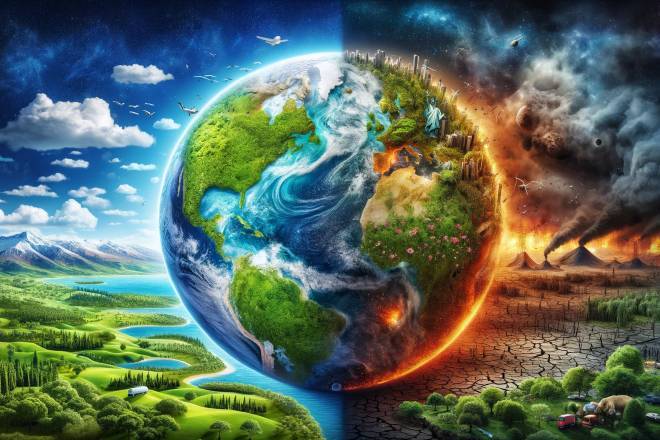
A Wake-Up Call: The Urgent Need for Renewable Green Energy
In an alarming revelation revelaed on the BBC news website today, the EU's climate service has reported that for the first time, global warming has exceeded 1.5C across an entire year. This breach, marking a historical precedent, does not yet violate the Paris Agreement's long-term goal set in 2015 but signals our perilous approach towards irreversible climate thresholds. The period from February 2023 to January 2024 witnessed a 1.52C increase in global temperatures, underscoring the relentless climb of our planet's fever.
Beyond the Threshold: Implications and Actions
This development comes amidst the backdrop of political shifts, with significant policy retractions from major political entities. The recent decision by the UK's Labour Party to abandon its £28bn annual green investment plan, alongside the Conservatives' rollback on key climate targets, starkly contrasts the urgent call for comprehensive climate action articulated by scientists worldwide. This juxtaposition of political retreat and environmental exigency paints a vivid picture of the challenges we face in mobilizing for our planet's future.
The breach of the 1.5C mark, driven predominantly by human activities such as fossil fuel combustion, emphasizes the non-negotiable need for swift, decisive action to reduce carbon emissions. The additional warmth of recent months, further stoked by a natural El Niño event, serves as a stark reminder of our warming world's volatility. While El Niño is expected to wane, offering a temporary respite, the relentless rise in atmospheric greenhouse gas concentrations foreshadows an inevitable trend of escalating global temperatures.
The Paris Agreement and the Path Forward
The Paris Agreement, aiming to cap global warming at 1.5C above pre-industrial levels, symbolizes the collective aspiration to avert the most catastrophic impacts of climate change. The breach of this threshold, albeit temporarily, should not be misconstrued as the crossing of a point of no return but rather as a clarion call to reinforce our commitment to climate action.
The distinction between experiencing 1.5C as a fleeting anomaly and normalizing such warming as a long-term average bears profound implications. Crossing the Paris threshold as a long-term average, potentially within the next decade at current emission rates, would not only symbolize a failure to uphold our global commitment but also exacerbate the risks of triggering irreversible tipping points within our climate system.
A Silver Lining: The Power of Human Action
Despite the grim forecasts, hope remains resilient. The surge in green technologies, from renewables to electric vehicles, exemplifies the tangible progress achievable through innovation and policy. The once-feared scenarios of a 4C warmer world are now deemed less likely, thanks to the global pivot towards sustainable solutions.
The path to limiting global warming hinges on our collective actions. Achieving net zero carbon emissions, with an ambitious target of halving emissions by this decade, is pivotal. The transition to renewable green energy is not merely an environmental imperative but a testament to human ingenuity and resilience. As we stand at this critical juncture, let us choose a future powered by the sun, wind, and water—energies that promise a sustainable, flourishing planet for generations to come.
The message is clear: doom is not inevitable. Our choices, both individual and collective, have the power to steer the world towards a sustainable trajectory. Let this moment of exceeding 1.5C be a catalyst for accelerated action, inspiring a renewed commitment to the Paris Agreement and the urgent, transformative change it necessitates.
